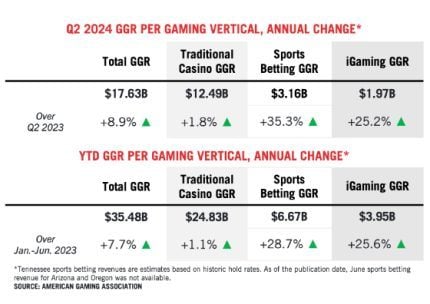Posted on: August 16, 2024, 03:25h.
Last updated on: August 16, 2024, 03:25h.
Gamblers in the United States lost $17.63 billion during the second quarter playing at commercial casinos, iGaming websites, and betting on sports.

The American Gaming Association (AGA) reports that gross gaming revenue in the 37 states and Washington, D.C. where some form of commercial gaming is allowed totaled $17.63 billion. That marks a nearly 9% gain on the same quarter in 2023 and represents the richest second quarter ever for the U.S. commercial gaming industry.
Q2 of 2024 was the commercial gaming industry’s 14th consecutive growth quarter. Twenty-four of the commercial gaming jurisdictions experienced year-over-year quarterly growth.
iGaming in the seven states where online casino slots and table games are permitted reached a record $1.98 billion, a 26% increase that was helped by Rhode Island’s iGaming market introduction in March.
Sports betting last year expanded into Kentucky, Maine, North Carolina, and Vermont, which propelled oddsmakers to increase their hold to $3.16 billion, a 35% surge. Nationwide, commercial oddsmakers fielded approximately $31.75 billion in bets.
Legacy gaming, or gambling inside casinos, saw gross revenue inch upwards 1.8% to $12.49 billion. That small gain came despite new casinos opening in several states.

Traditional Gaming Growth, Concerns
While sports betting continues to dominate the gaming industry news cycle, and several states are mulling whether to authorize iGaming, a gaming vertical that delivers considerably more tax revenue than sports gambling, the AGA says gains were made in traditional play during the April through June period.
“While sports betting and iGaming continued to drive overall industry revenue growth in the second quarter, new brick-and-mortar property openings in Illinois, Nebraska, and Virginia also led to rising traditional commercial gaming revenue,” said AGA Vice President of Research David Forman.
Forman cautioned, however, that the retail gaming industry is seeking revenue slowdowns in certain markets. Ongoing higher costs for daily necessities have been blamed for reduced consumer spending on nonessential goods and entertainment like casino gambling.
Across the country, land-based gaming markets are seeing mixed year-over-year comparisons due to slower consumer spending economy-wide, which may continue to be a factor through the remainder of 2024,” Forman said.
The Louisiana Gaming Control Board yesterday revealed that in-person casino revenue fell 6% in July. Gross revenue at Illinois casinos slid almost 2% and Virginia casino win dropped 3%.
In New Jersey, the second richest gaming state behind Nevada, Atlantic City’s nine casinos said in-person play more than 6%.
Year-to-Date Growth
Through six months, the AGA says total gross gaming win was just shy of $35.5 billion, up about 8% from the six months in 2023.
Sports betting win jumped 29% to $6.67 billion and iGaming operators won $3.95 billion, almost 26% richer. Retail casino gaming revenue was up 1.1% to $24.83 billion.
Commercial gaming revenue last year totaled a record $66.5 billion. It marked the industry’s third consecutive yearly record.
The AGA is the national trade group that represents the interests of commercial and tribal gaming in the nation’s capital and across state governments. The lobby works to foster policies and business environments where legal, regulated gaming thrives.
The AGA opposes offshore websites that facilitate illegal iGaming and sports betting and is campaigning in states where controversial grey gaming machines labeled “skill games” operate, most specifically in Pennsylvania, Virginia, Kentucky, Missouri, and Illinois.
The AGA’s quarterly revenue report does not include revenue from tribal casinos, tribal sportsbooks, lottery revenue, or other regulated gambling.


